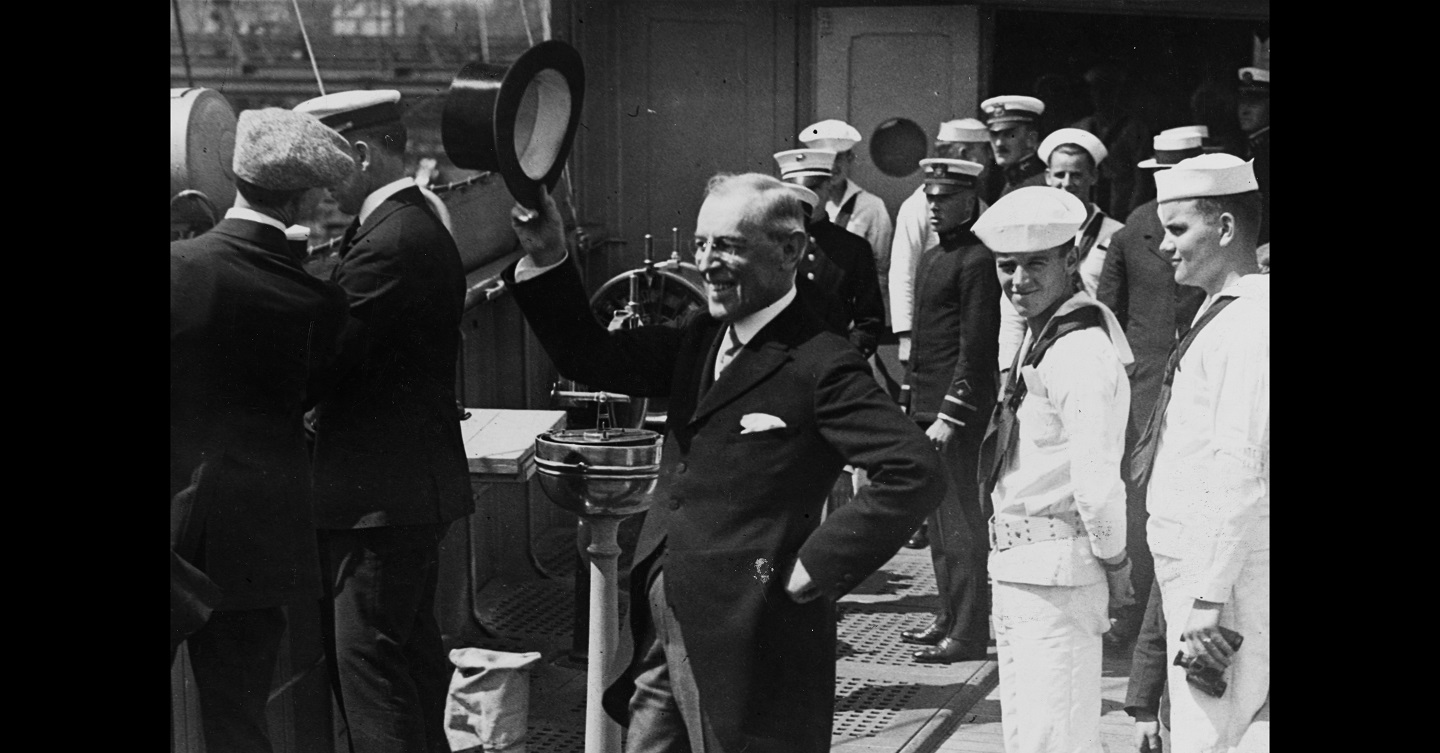
Afghanistan has reached a new level of instability in which an Islamist militant group has taken over control of the government, but in which the country still suffers from violence and volatility of numerous other terrorist organizations
The United States Must Learn from the Past – Lessons from Wilsonian Foreign Policy
It’s all over – America’s longest running war came to a close on July 2, 2021. Only a few months before, on April 14, 2021, President Joseph Biden announced the 20-year long war in Afghanistan would conclude before its twentieth anniversary. On July 6, the U.S. military confirmed that American troops had withdrawn from Bagram Air Field, the last large formation of troops in the country, signaling the end of combat operations in Afghanistan. Less than six weeks later, the Taliban entered Kabul and announced the end of the Ghani administration and reasserted Taliban rule in the country. Afghanistan has reached a new level of instability in which an Islamist militant group has taken over control of the government, but in which the country still suffers from violence and volatility of numerous other terrorist organizations such as the Islamic State Khorasan (ISIS-K), Haqqani, Jamiat-e Islami-yi, Al-Qaeda, and many others.
These terrorist organizations act to further destabilize the fabric of civil security at the district level and make up the preponderance of violence in Afghanistan. However, the United States and coalition forces must now do everything they can to provide for security to prevent attacks against the United States and its partners’ homelands. It must be clearly stated that this is not an argument for interventionist and reoccupation policies in Afghanistan. This is an argument for collective security and the containment of the terrorist threats in Afghanistan from preventing external operations against the U.S. and our Allies.
But does Afghanistan present a new problem? Or are there historical lessons that might be learned about state formation and the ways nascent states uphold sovereignty and contribute to the stabilization or destabilization of the region and even the globe? What might be the role for countries such as the United States and others in preserving sovereignty while also preventing attacks on their own territory? Perhaps it is time to draw on an idea from over a century ago: Wilsonian collective security. In the post-U.S. and Coalition partner withdrawal from Afghanistan, the United States and invested partners can better ensure some peace and stability in the country, and South Asia more broadly, by establishing an international treaty or a series of agreements on Afghanistan’s collective security which protects Afghanistan’s future self-determination and civil governance. This will require an enormous amount of energy by the international community considering only eleven countries currently engage with the Islamic Emirate of Afghanistan diplomatically, however, this is a tremendous opportunity for the United States and its Allies to leverage international institutions such as the World Bank or the UN to engage indirectly.
For context, following WWI, American president Woodrow Wilson championed the principle of collective security, primarily through the League of Nations in what Inis Claude concluded would, “prevent or suppress aggression by any state against another state, by presenting to potential aggressors the credible threat and to the potential victim of aggression the reliable promise of effective collective measures ranging from diplomatic boycott through economic pressure to military sanctions, to enforce the peace.” One of the primary reasons the principle of collective security applies to Afghanistan is because the country is newly reorganized state. Although Afghanistan is not a new country, it is transitioning to a new era – an era of non-occupation, the first time since 2001. This era is very similar to many countries who were newly created after the First World War. Additionally, although there are many indicators that Afghanistan is a modern state, in many ways, common 21st century ideas and cultural values, and practical modern views have not made their way into Afghanistan, largely because Afghanistan did not participate in the wider industrial and technological revolutions of the 18th and 19th centuries. Therefore, many of the common problems the West faced in the 19th century, Afghanistan, largely outside of Kabul, still faces today, such as access to health care and education for all citizens, civil governance, functioning local public works and utilities systems.
Not only is Afghanistan relatively new in its current form, but it is also in currently in an internal power struggle. The country will be either ruled by a modern system of democratic governance, or sharia law from Taliban leaders through semi-organized violence forcing the country back into a repressed state or ruled by unelected leaders. Conversely, the goal for the international community through collective security is to ensure that Afghanistan succeeds in becoming a productive member state in the South Asia. This is not a renewed argument for nation-building. The United States, its Allies, and South Asian states must assist Afghanistan in providing for its civil security and defense to enable future successful elections and self-government, open diplomacy, national self-determination, stronger trade deals, and laws with neighboring states thereby ensuring equal commercial access, participation in international organizations, and maintaining territorial integrity of its borders. These internationalist ideals would benefit not only Afghanistan but the wider South Asian region. Yet, these ideals for a new state are not possible without first establishing a net of security by the wider international community.
These Western Allies have borne the lion’s share of work in security in Afghanistan over the past twenty years, primarily based on preventing attacks in their own homelands, and will continue to be the most reliable partners going forward.
Applying the Wilsonian Principle of Collective Security – Lessons and Normative Practices
Providing for Afghanistan’s security is incredibly important based on the destabilizing internal and external factors the country faces over the coming years. Nonetheless, this effort is not possible without collaboration, as Wilson noted after the conclusion of the First World War. The wider international community through the UN and NATO primarily, must commit to an international treaty, or a series of agreements, on the security of Afghanistan which must be based on several pillars:
First, as the Atlantic Council has argued, collective security must be based upon alliances with committed partners such as the US, UK, France, Germany, and Italy. These Western Allies have borne the lion’s share of work in security in Afghanistan over the past twenty years, primarily based on preventing attacks in their own homelands, and will continue to be the most reliable partners going forward. Additionally, long-term security partnerships could also open the door to future relationships for the U.S. and NATO partners. The U.S. could benefit from having a closer relationship with Pakistan in particular. Examples such as Biden Administration nearing an agreement with the Pakistani government to conduct military and intelligence operations is encouraging. By insisting on territorial integrity of both country’s borders, and potentially hosting events for each country which focus on the collective security of the Afghanistan / Pakistan (AF/PAK) region from harboring terrorist organizations such as ISIS-K.
Secondly, there must be a continued focus on intelligence collection and analysis in order to prevent future transnational attacks through Over-the-Horizon operations. President Biden specifically noted this in his April 14th Afghanistan Withdrawal speech when he said, “But we’ll not take our eye off the terrorist threat. We’ll reorganize our counterterrorism capabilities and the substantial assets in the region to prevent reemergence of terrorists — of the threat to our homeland from over the horizon. We’ll hold the Taliban accountable for its commitment not to allow any terrorists to threaten the United States or its Allies from Afghan soil.” This commitment has been noted as recently as August 27, 2021 in which the Biden Administration authorized a kinetic strike against an ISIS-K planner who was intending to attack the Hamid Karzai International Airport during U.S. civilian evacuations. Although this particular drone strike unintentionally killed multiple civilians and an aid worker, drone strikes, or kinetic strikes, are one of several flexible response options for the President in order to prevent attacks against the United States and European homelands. Over the past two decades, the U.S. military, has compiled a dense library of literature on the efficacy of kinetic strikes, cross examining data from High Value Individuals/Targets (HVI/Ts) based on multiple layers of intelligence. Without the commitment of the United States and its Allies’ troops on ground in Afghanistan the West is left with few options to prevent attacks on the homeland. Organizations such as Al-Qaeda in the Indian Subcontinent (AQIS) and ISIS-K, amongst others, will continue to grow in capability if Afghanistan cannot provide for its own defense or if the commitment to collective security by international partners wanes.
Next, the United States and Allies must maintain a continued focus on intelligence collection and analysis on foreign threats inside of Afghanistan to prevent another 9/11-type of attack. This focus must come in the form of commitment to Counter Terrorism (CT) operations, and a unified support system for joint military exercises and collective training exercises with South Asian partners and NATO partners. Although the U.S. will not have troops based in Afghanistan as before, the U.S. will still maintain CT capabilities in the region sufficient to ensure that Afghanistan cannot again become a safe haven for terrorists who threaten our security,” notes David F. Helvey, the acting secretary of defense for Indo-Pacific security affairs. The United States and her partners must also consider leveraging the capabilities of stakeholders in the region such as Pakistan and India. Although Pakistan and India disagree on many things, the threat of ISIS-K is not one of them. Both fear the destabilizing nature of the terrorist organization. Collective security, especially as it applies to disputed territories adjacent to Afghanistan, such as the Kashmir region, could provide at least a surface level relationship and opportunities to cooperate successfully on a bedrock issue like national security to both Pakistan and India.
Lastly, collective security agreements also provide the United States and the West a path to move past the Global War on Terrorism (GWOT), and the opportunity to engage through existing international institutions establishing a long-term democratic partner for stability in a regionally unstable part of the world. Afghanistan will continue to be a country of great regional importance to other great powers such as Russia and its focus on security along its periphery, and China, through its Belt and Road Initiative. Having a reliable democratic partner in South Asia provides a foothold for diplomatic initiatives in a routinely ignored part of the world, elevating the region to its new place of importance based on the Interim National Security Strategy, as the U.S. pivots its foreign policy towards Asia. As Woodrow Wilson realized the need for international cooperation through institutions and binding agreements more than a century ago, the U.S. must now again insist on the principle of collective security to not only prevent future attacks but provide for its stability to ensure it remains a reliable partner. The U.S. can accomplish this with significant coordination and cooperation from Western partners and leaning upon long lasting relationships with current South Asian leaders. Although, these agreements must be secured within the immediate future. The longer the United States and Allies remain detached from South Asia, the greater the threat from the growing terrorist presence in Afghanistan could affect the United States and her partners. The next few months may perhaps solidify or weaken the legacy the West leaves in Afghanistan, and collective security will likely remain the key foundational issue.
Nathan Trimble is an active duty intelligence officer in special operations. He has multiple tours to South Asia and is currently a PhD student at Vanderbilt University.
The views expressed in this article are those of the author and do not necessarily reflect those of the U.S. Army War College, the U.S. Army, or the Department of Defense.
Photo Description: President Woodrow Wilson (center) waves his top hat from the deck of USS George Washington (ID # 3018), as she steamed up New York Harbor upon the President’s return to the U.S. from the World War I peace conference in France, 8 July 1919.
Photo Credit: Courtesy of Naval History and Heritage Command





With regard to our article above, might we need to consider the following suggested “root cause of terrorism?”:
“In particular when economies undergo the transition from clientalism to market-capitalism, those societal groups (the old elite and their economically vulnerable clientele as well as traditionalists and the religious) that have benefited from the pre-market clientalist-traditionalist order of society may intentionally target the USA to effectively voice dissent and to roll back pro-market developments and punish the USA for its perceived role in capitalism, globalization, and the Americanization of their societies.”
In truth, is this what “collective security” is supposed to deal with — in Afghanistan and/or elsewhere?
Apologies:
The above quote can be found in the article “The Rise of Capitalism and the Roots of Anti-American Terrorism,” by Tim Krieger and Daniel Meierrieks, in the Journal of Peace Research, Vol 52, No. 1 (January 2015), page 59, column “a.”
While the “root cause of terrorism” thesis — found in the quoted item of my initial comment above — addresses terrorism originating in and emanating from foreign countries and foreign peoples,
Might this exact same “root cause of terrorism” apply to terrorism originating in and emanating from (a) our own countries here in the U.S./the West today and, thus, (b) from our own populations currently?
In this regard:
a. Are not — in the U.S./the West also — “the old elite and their economically vulnerable clientele as well as traditionalists and the religious” now — and much like their counter-parts overseas —
b. “Voicing dissent and attempting to roll back pro-market developments and punish U.S./Western governments;” this, for (a) pursuing such (alienating/power-destroying?) political, economic, social and/or value “changes” which are (b) demanded by such things as capitalism, globalization and the global economy today?
Thus, the need to consider such things as “collective security,” today, from this much more comprehensive — and thus both at home and abroad — “root cause of terrorism” point of view?